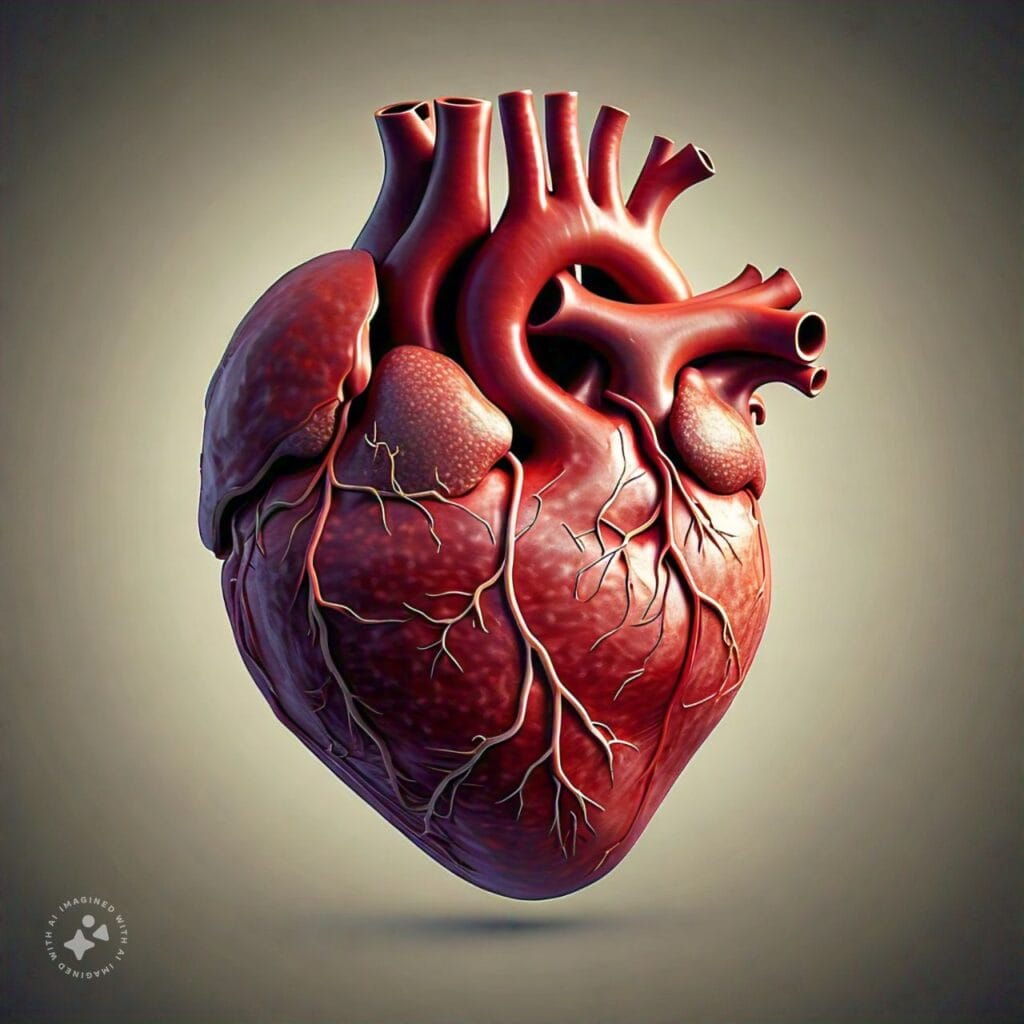“Powerful Symptoms Of Cardiomyopathy ?” Article helps in knowing that the Cardiomyopathy is a disease of the heart muscle that affects its size, shape, and ability to pump blood effectively. There are several types, each with different causes and implications. Here’s a brief overview.
Types of Cardiomyopathy
Dilated Cardiomyopathy (DCM)
Dilated Cardiomyopathy: The most common form, where the heart’s chambers enlarge and weaken, leading to reduced pumping efficiency. It can be caused by genetic factors, infections, or exposure to toxins.
Overview
Dilated cardiomyopathy (DCM) is a condition where the heart’s chambers, particularly the left ventricle, become enlarged (dilated) and weakened. This leads to a decreased ability of the heart to pump blood effectively, which can result in heart failure and other complications.
Causes
DCM can be caused by various factors, including:
- Genetic Factors: Many cases are hereditary, with mutations in genes responsible for heart muscle structure and function.
- Myocarditis: Inflammation of the heart muscle, often due to viral infections, can lead to DCM.
- Toxic Substances: Alcohol abuse, certain chemotherapy drugs, and other toxins can damage the heart muscle.
- Nutritional Deficiencies: Lack of essential nutrients, particularly thiamine (Vitamin B1), can contribute to the condition.
- Chronic Conditions: Diseases like diabetes, hypertension, and thyroid disorders can increase the risk of DCM.
Hypertrophic Cardiomyopathy (HCM)
Hypertrophic Cardiomyopathy:
Characterized by the thickening of the heart muscle, often inherited. This can obstruct blood flow and lead to arrhythmias.
Overview
Hypertrophic cardiomyopathy (HCM) is a genetic condition characterized by the abnormal thickening of the heart muscle, particularly the left ventricle. This thickening can obstruct blood flow and affect the heart’s ability to function properly, potentially leading to various complications, including heart failure and arrhythmias.
Causes
HCM is primarily caused by genetic mutations that affect the proteins in the heart muscle. These mutations can be inherited in an autosomal dominant manner, meaning only one copy of the mutated gene from an affected parent is needed to pass the condition to offspring. Common causes include:
- Genetic Mutations: Mutations in genes that encode proteins of the cardiac sarcomere (the basic contractile unit of muscle fibers) are often responsible.
- Family History: HCM often runs in families, and many people with HCM have relatives with the condition.
Restrictive Cardiomyopathy (RCM)
Restrictive Cardiomyopathy:
The heart muscle becomes rigid, making it difficult for the heart to fill with blood. This can be caused by conditions like amyloidosis or other infiltrative diseases.
Overview
Restrictive cardiomyopathy (RCM) is a type of heart muscle disease characterized by the stiffening and rigidity of the heart walls, which impairs the heart’s ability to fill with blood during diastole (the relaxation phase). Unlike other forms of cardiomyopathy, the heart muscle remains relatively normal in thickness but loses its elasticity.
Causes
RCM can be caused by various conditions, including:
- Infiltrative Diseases: Conditions where abnormal substances build up in the heart muscle, such as:
- Amyloidosis: A condition where amyloid proteins accumulate in organs and tissues.
- Sarcoidosis: An inflammatory disease that can affect the heart.
- Hemochromatosis: Excess iron deposition in tissues.
- Fibrosis: Scarring of the heart tissue due to previous heart damage or disease.
- Radiation Therapy: Prior treatment for cancers can lead to heart damage over time.
- Certain Medications: Long-term use of some medications, such as certain chemotherapeutic agents.
- Idiopathic: In many cases, the exact cause remains unknown.
Arrhythmogenic Right Ventricular Cardiomyopathy (ARVC)
Arrhythmogenic Right Ventricular Cardiomyopathy (ARVC): A rare type where fat or fibrous tissue replaces heart muscle, particularly affecting the right ventricle. It can lead to arrhythmias and is often inherited.
Overview
Arrhythmogenic right ventricular cardiomyopathy (ARVC) is a rare form of cardiomyopathy characterized by the replacement of heart muscle in the right ventricle with fatty or fibrous tissue. This replacement leads to arrhythmias (irregular heartbeats) and can result in impaired heart function, particularly in younger individuals, and is often associated with a risk of sudden cardiac death.
Causes
ARVC is primarily a genetic condition, often inherited in an autosomal dominant manner. Some key factors include:
- Genetic Mutations: Mutations in genes responsible for desmosomes (structures that connect heart muscle cells) are common. These include genes such as PKP2, DSP, and DSG2.
- Family History: ARVC often runs in families, and many individuals with the condition have relatives who have also been diagnosed.

Symptoms
Symptoms of dilated cardiomyopathy may include:
- Shortness of breath, especially during physical activity or when lying flat
- Fatigue and weakness
- Swelling in the legs, ankles, and feet (edema)
- Irregular heartbeats or palpitations
- Dizziness or fainting
- Chest pain (in some cases)
Diagnosis
Diagnosing DCM involves several steps:
- Medical History and Physical Examination: A healthcare provider will assess symptoms and listen to the heart for abnormal sounds.
- Imaging Tests:
- Echocardiogram: This ultrasound test provides images of the heart’s structure and function.
- MRI: Magnetic resonance imaging can give detailed images of the heart muscle.
- Electrocardiogram (ECG): This test records the electrical activity of the heart to identify arrhythmias.
- Blood Tests: These can help detect underlying conditions or markers of heart failure.
Treatment
Treatment for Dilated Cardiomyopathy aims to improve heart function and relieve symptoms. Options may include:
Medications:
- ACE Inhibitors: Help relax blood vessels and reduce the heart’s workload.
- Beta-Blockers: Slow the heart rate and lower blood pressure.
- Diuretics: Help reduce fluid buildup in the body.
- Anticoagulants: May be prescribed to prevent blood clots.
Treatment for Hypertrophic Cardiomyopathy focuses on relieving symptoms and preventing complications. Options include:
Medications:
- Beta-Blockers: Help slow the heart rate and reduce chest pain.
- Calcium Channel Blockers: May be used to relax the heart muscle and improve blood flow.
- Anticoagulants: Sometimes prescribed to reduce the risk of blood clots.
Treatment for Restrictive Rardiomyopathy focuses on managing symptoms and underlying causes. Options may include:
Medications:
- Diuretics: Help reduce fluid buildup in the body.
- ACE Inhibitors or Angiotensin Receptor Blockers (ARBs): Help lower blood pressure and reduce strain on the heart.
- Beta-Blockers: May help manage heart rate and rhythm.
Treatment for ARVC focuses on managing symptoms and reducing the risk of complications. Options include:
Medications:
- Beta-Blockers: Often prescribed to help control heart rate and reduce the risk of arrhythmias.
- Antiarrhythmic Drugs: May be used to manage specific arrhythmias.
Lifestyle Changes:
- Heart-healthy diet (low in salt and saturated fats)
- Regular exercise, as tolerated
- Avoiding alcohol and smoking
Devices:
- Implantable Cardioverter-Defibrillators (ICDs): Help prevent sudden cardiac arrest in high-risk patients.
- Biventricular Pacemakers: Used in some patients to improve the heart’s pumping efficcy.
Surgery:
In severe cases, heart transplant may be necessary.
Prognosis
The prognosis for individuals with ARVC varies. With appropriate management, many people can lead relatively normal lives, although regular monitoring and follow-ups with a healthcare provider are essential due to the risk of arrhythmias and sudden cardiac events.
References and External Links
- American Heart Association (AHA): Arrhythmogenic Right Ventricular Cardiomyopathy
- Mayo Clinic: Arrhythmogenic Right Ventricular Cardiomyopathy
- Cleveland Clinic: Arrhythmogenic Right Ventricular Cardiomyopathy
- National Heart, Lung, and Blood Institute (NHLBI): What is Arrhythmogenic Right Ventricular Cardiomyopathy?
frequently asked questions (FAQs) about cardiomyopathy:
1. What is cardiomyopathy?
Cardiomyopathy refers to diseases of the heart muscle that affect its size, shape, and ability to pump blood effectively. There are several types, including dilated, hypertrophic, restrictive, and arrhythmogenic right ventricular cardiomyopathy.
2. What are the main types of cardiomyopathy?
The main types are:
- Dilated Cardiomyopathy (DCM): Enlarged heart chambers lead to weakened pumping ability.
- Hypertrophic Cardiomyopathy (HCM): Thickened heart muscle that can obstruct blood flow.
- Restrictive Cardiomyopathy (RCM): Stiff heart muscle that impairs filling.
- Arrhythmogenic Right Ventricular Cardiomyopathy (ARVC): Replacement of heart muscle with fatty or fibrous tissue.
3. What are the common symptoms of cardiomyopathy?
Common symptoms include shortness of breath, fatigue, swelling in the legs and ankles, palpitations, dizziness, and chest pain.
4. How is cardiomyopathy diagnosed?
Diagnosis typically involves a combination of medical history, physical examination, echocardiograms, electrocardiograms (ECGs), MRI, and blood tests. Genetic testing may also be performed in some cases.
5. What causes cardiomyopathy?
Causes vary by type and may include genetic factors, long-term high blood pressure, heart valve disease, infections, alcohol abuse, certain medications, and metabolic disorders.
6. How is cardiomyopathy treated?
Treatment depends on the type and severity but may include medications (like beta-blockers and diuretics), lifestyle changes, implantable devices (like ICDs), and, in severe cases, heart transplant.
7. Can cardiomyopathy be inherited?
Yes, certain types of cardiomyopathy, particularly hypertrophic cardiomyopathy and arrhythmogenic right ventricular cardiomyopathy, can be inherited. Genetic testing and family screening are often recommended for those with a family history.
8. What lifestyle changes can help manage cardiomyopathy?
Lifestyle changes can include adopting a heart-healthy diet, engaging in regular, moderate exercise (as advised by a healthcare provider), managing stress, avoiding alcohol and smoking, and maintaining a healthy weight.
9. What are the complications of cardiomyopathy?
Complications can include heart failure, arrhythmias, blood clots, and increased risk of sudden cardiac arrest, especially in younger patients or athletes.
10. How often should someone with cardiomyopathy see a doctor?
Regular follow-ups with a healthcare provider are essential for monitoring heart function and adjusting treatment plans. The frequency of visits will depend on the severity of the condition and the presence of symptoms.
